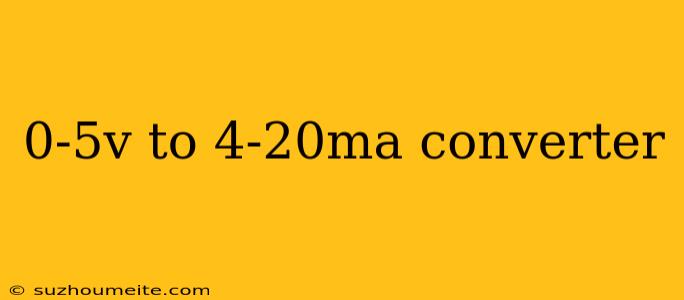0-5V to 4-20mA Converter: A Comprehensive Guide
Introduction
In the world of industrial automation, signal conversion is a crucial process that enables the transmission of signals between devices with different output ranges. One such conversion is the 0-5V to 4-20mA conversion, which is widely used in industrial control systems, process automation, and instrumentation. In this article, we will delve into the world of 0-5V to 4-20mA converters, exploring their principles, types, applications, and benefits.
Principle of Operation
A 0-5V to 4-20mA converter is a device that converts a 0-5V DC signal from a sensor or transmitter into a 4-20mA current signal. This conversion is necessary because many industrial devices, such as valves, actuators, and transmitters, require a 4-20mA signal to operate. The converter uses an internal amplifier and voltage-to-current converter to achieve this conversion.
Types of 0-5V to 4-20mA Converters
There are two main types of 0-5V to 4-20mA converters:
Analog Converters
Analog converters use an operational amplifier (op-amp) to amplify the input voltage signal and then convert it to a current signal using a voltage-to-current converter. These converters are simple, low-cost, and widely available.
Digital Converters
Digital converters use a microcontroller or digital signal processing (DSP) chip to convert the input voltage signal to a digital signal, which is then converted to a 4-20mA current signal using a digital-to-analog converter (DAC). These converters offer higher accuracy and flexibility than analog converters.
Applications of 0-5V to 4-20mA Converters
0-5V to 4-20mA converters are widely used in various industries, including:
Process Automation
In process automation, these converters are used to convert sensor signals from temperature, pressure, and level transmitters to 4-20mA signals for transmission to control systems.
Industrial Control Systems
In industrial control systems, 0-5V to 4-20mA converters are used to convert analog signals from sensors and transmitters to 4-20mA signals for transmission to actuators and valves.
Instrumentation
In instrumentation, these converters are used to convert signals from sensors and transducers to 4-20mA signals for transmission to indicators, recorders, and controllers.
Benefits of 0-5V to 4-20mA Converters
The use of 0-5V to 4-20mA converters offers several benefits, including:
Signal Conditioning
These converters provide signal conditioning, which ensures that the output signal is amplified, filtered, and isolated from the input signal.
Noise Reduction
0-5V to 4-20mA converters reduce noise and interference in the signal transmission, ensuring accurate and reliable data transmission.
Flexibility
These converters offer flexibility in terms of input and output ranges, allowing users to customize the conversion to suit their specific application needs.
Conclusion
In conclusion, 0-5V to 4-20mA converters play a vital role in industrial automation, process automation, and instrumentation. By understanding the principles, types, applications, and benefits of these converters, engineers and technicians can select the right converter for their specific application needs, ensuring accurate and reliable signal transmission.
